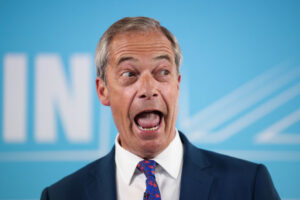Weeks before the present election campaign began, Keir Starmer raised eyebrows when he called for Labour candidates to “fly the flag” on St George’s Day, in an attempt to displace the Tories as the party of patriotism. But in truth, British patriotism is no longer the potent force it once was. For all the vision and ambition with which both the Brexit and Scottish independence movements announced themselves, these national revivals are faltering.
Come 4 July, the Scottish Nationalists are in danger of losing badly, having become bound up with a militant current of minoritarian social liberalism which undermines the collective and civic basis of classical nationalism, as it has historically existed on the Left. Meanwhile, the national project of the Brexiteers, which lives on the Right, fell short of its own lofty expectations: its architects in the Conservative Party (set to fare even worse than the SNP) proved unable to deliver on their promise of a Britain secure from the ravages of economic and cultural globalisation.
In short, Britons seem unable to do nationalism with any success or conviction, that is, to put it into practice beyond its merely performative aspects. So, as the election day approaches, where can the British political establishment look to form a coherent nation-based system?
There is, one place that anyone aspiring to a functional nationalism, in Britain or elsewhere, can take notes from: a forgotten corner of its former empire, where the people happen to do a decent job of maintaining themselves both as a nation and a state, even if it isn’t actually a state in the Westphalian sense. I’m talking about Quebec, a Canadian province that is also a nation unto itself, and one with its own fraught history of holding referendums. Today is Quebec’s own Fête nationale: Saint-Jean-Baptiste Day. And what better occasion to survey the trajectory of nationalism there?
The animating fact of Quebec politics and history is that of survivance, the desire of its people to survive as a distinct society of Francophones in the midst of an overwhelmingly Anglophone continent. Though Quebec’s identity is rooted in the French language and descends from a heritage that stretches back to New France, modern Quebec nationalism was forged in the Fifties and Sixties, in a time of immense social change known as la Révolution Tranquille (The Quiet Revolution). It saw the conservative and pro-clerical regime of Maurice Duplessis replaced by the reforming government of Jean Lesage, which nationalised utilities and took over education and welfare services from the Catholic Church; these measures established the modern contemporary incarnation of l’etat québécois or the Quebec state, looked to by its people as the supreme institutional expression of the Quebecois nation.
In the Seventies, desires arose among both the political-intellectual elite and the broad populace to make that Quebec state sovereign: their leader was journalist-turned-Lesage cabinet minister René Lévesque, who executed the utilities nationalisation scheme. His Parti Québécois (PQ) would lead the push for independence from Canada with the referendum of 1980; though it was rejected by a 60-40 margin, Lévesque’s government nonetheless largely shaped the character of Quebec nationalism for decades to come: Left-wing, pro-union, secularist, feminist, environmentalist, and aligned with global anti-colonial currents. It was under Lévesque as well that Quebec passed legislation to enshrine French as its official language, cementing the Quebec state’s role as defender of the national character.
La Révolution Tranquille, however, also spawned a divergent and opposing tradition: federalism, which may be understood formally to mean an acceptance of continued membership in the Canadian federation. But in Quebec, it also has deeper philosophical underpinnings: a kind of radical emancipatory individualist liberalism developed in the pages of the Duplessis-era dissident journal Cité Libre. Its great champion was Pierre Trudeau, who as prime minister of Canada prevailed in the 1980 referendum, but whose subsequent actions sowed the seeds of the knife-edge second referendum of 1995, when Quebec nearly seceded, had it not been for a 54,288-vote margin (1.16%) in favour of “Non”.
For 40 years, Quebec politics was a struggle between the two poles, nationalist-sovereigntist and federalist, with “soft” or semi-nationalist compromises sometimes gaining ground. By the 2010s, however, something different was happening, a depolarisation of the old sovereignty debate and the emergence of a new alternative: firmly nationalist but agnostic or neutral on independence. Such a stance meant that the Coalition Avenir Québec (CAQ) could attract both soft nationalists and sovereigntists, amounting to a majority of the Francophone electorate. Indeed, this was the formula that its founder and leader François Legault used to win power in the elections of 2018 and 2022.
The CAQ has pledged to leave behind the quest for independence, treating it as a settled affair (Legault was a former PQ minister). But it has never hesitated to brandish its nationalist credentials in other ways, namely its aggressive agendas on language, culture, and migration: these can be discerned in a bevy of new regulations expanding French-language requirements for businesses, immigrants and English universities, in addition to raising the latter’s tuition costs. Legault has also routinely squared off with Justin Trudeau’s federal government, pressuring it to act more decisively in halting the flow of refugees through Quebec’s borders, as well as proposing a referendum — not on independence — but on strengthening immigration powers.
Though what is significant from a historical point of view is what the CAQ represents: the re-emergence of Right-wing nationalism as a dominant force. Indeed, the intellectual implications of this tendency are only now being fleshed out by a new generation of thinkers, led by the likes of Étienne-Alexandre Beauregard, Legault’s 23-year-old speechwriter, who published a treatise Le Retour des Bleus (“Return of the Blues”) attempting to revive the conservative or bleu strain of Quebec nationalism; this would entail a rehabilitation of figures such as Duplessis, whose legacy remains anathema to the largely progressive sovereigntist movement.
Just as interesting is the recent resurgence of the PQ as the chief opposition to Legault’s CAQ. After having been written off as a dying Boomer-era artefact, the sovereigntist party has risen in the polls under an energetic young leader Paul St-Pierre Plamondon, who has threatened to hold a third referendum on independence. However, tough support for the PQ has not actually translated into support for the idea of sovereignty, suggesting that this boost in the PQ’s fortunes has more to do with voicing dissatisfaction with Legault than with Quebecers wanting to revisit the issue.
All of which means that Quebec politics now appears to be a contest between two vigorous but antagonistic nationalisms; a fact highlighted by the decline of the federalist Quebec Liberals. Though the tension is genuine, these two variants of nationalism are nonetheless united both in their recognition of the Quebec nation as a civic-collective entity, as illustrated by their common resistance to the minoritarian social liberalism that’s taken hold in the rest of Canada; and in their shared readiness to deploy the powers of the Quebec state as a means of safeguarding that nation (leaving aside whether that state should be sovereign), as shown by the activist policies of the nationalist parties, Left and Right. As a result, for instance, Quebec’s language regime may seem absurd or even vindictive to outsiders and non-Francophones, but it starts to make a bit more sense when viewed as part of a larger historical project, that of ensuring national survivance.
These linguistic and cultural differences aside, we can glean the operative principle for those — in Britain, America or Anglo-Canada or elsewhere — who find themselves drawn to the nationalist persuasion after years of hyper-globalisation: the nation-state only makes sense if both its constituent terms are taken seriously.
For those on the Left, reclaiming the nation requires promoting unifying bonds and symbols of nationhood over and above the subaltern identity politics that’s become fashionable across the West, for the nation is ultimately what legitimates the state. For the Right, meanwhile, a constructive nationalism in the post-Brexit era will have to rest on restoring the state and its capacity to act in defence of the nation, most of all with respect to borders and rebuilding industry. It will involve a rejection of that odious and long descredited combination of free market-ism and flag waving that’s been the standard of the Anglo-Saxon Right for decades.
For as many a Québécois can attest, without a powerful state to act on your behalf in a hostile world, any nation, no matter how historically great, is liable to be reduced to, in David Starkey’s phrase, a “feeble little country.”
Disclaimer
Some of the posts we share are controversial and we do not necessarily agree with them in the whole extend. Sometimes we agree with the content or part of it but we do not agree with the narration or language. Nevertheless we find them somehow interesting, valuable and/or informative or we share them, because we strongly believe in freedom of speech, free press and journalism. We strongly encourage you to have a critical approach to all the content, do your own research and analysis to build your own opinion.
We would be glad to have your feedback.
Source: UnHerd Read the original article here: https://unherd.com/



